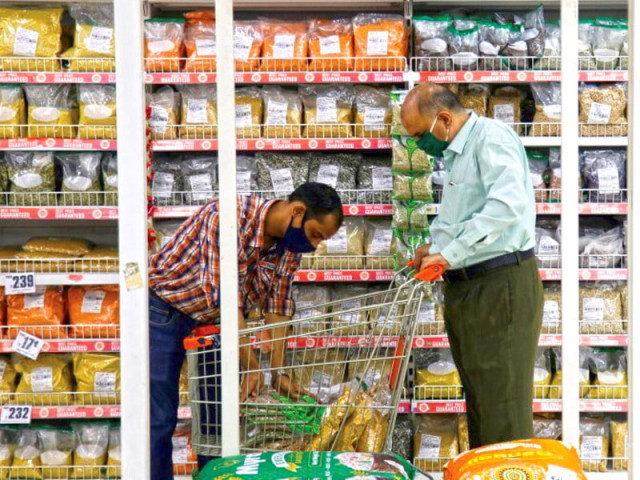Inflation woes : People troubled by rising food prices
Citizens’ buying power compromised, most cannot afford monthly grocery

The continuous plummet of the Pakistani rupee against the dollar, in the wake of crippling inflation, has started to weigh heavy on the urban middle class. Tens and thousands of people who’d manage to fare well during previous years now have their buying power compromised; struggling to afford basic grocery items and making ends meet. While at the same time, many shopkeepers have made the situation worse by trying to exploit buyers and profit from the crisis. In this regard, the Sindh government has although directed the district administration and concerned agencies to intensify action against profiteers and control food prices, but much of this has remained limited to lip-service it seems.
Farida Khatun, a resident of Karachi’s Kemari area, says that it has become impossible for her to manage household expenditures on her husband’s limited income. “Inflation has made everything twice as expensive today, but there has been no increase in household income. All our funds are exhausted by the middle of the month and we no option but to borrow money,” she told.
Similarly, Shahnaz Akhtar, another middle-income homemaker, said that after the continuous rise in petroleum prices, prices of food items have also shot up. “For instance, the price of a five kilogramme mill flour bag is is rupees 400 to 450, open flour costs rupees 70 to 80, oil bags are retailing for rupees 400 to rupees 450, and even lentils and vegetables that are the main food item for the poor and middle class have become too expensive to afford,” said the distressed homemaker.
Speaking in the regard, Mohammad Naeem, who is the owner of a grocery store, confirmed that there has been a significant change in people’s buying behavior. “Most middle-income families who’d buy monthly or weekly grocery until a few months ago can no longer afford to buy in bulk. So they now rely on buying grocery on a daily basis or buy on credit,” he informed.
According to Kashif Khan, a resident of Liaquatabad, one of a main reasons for the recent rise in inflation is that the Price Control Bureau and the district administration are inactive throughout the city. “Action is taken only to complete the formality. The shopkeepers are charging exorbitant prices for groceries. Prices vary from area to area, but the city is currently divided into three parts in terms of prices. Food prices vary between elite, middle and poor class areas but almost everyone’s facing the brunt of a failing economy on some level,” he complained.
When asked to comment on the matter, Bureau of Prices and Supplies Assistant Director Ali Haider Arain said that the prices of fruits and vegetables are fixed at the retail level by the Divisional Price Controller (Commissioner). “After the approval of Sindh Cabinet, more powers will be given to Bureau of Supply and Prices. The prices of groceries and other items have not been fixed for a long time. We monitor the prices of fruits and vegetables in the market together with other departments,” he informed.
Speaking in regard to lack of price control, Sindh Chief Minister’s Advisor Waqar Mehdi said that the Chief Minister has issued instructions to the commissioners, deputy commissioners and other district administrations and institutions to control the prices of food items. “Steps are being taken in this regard,” he told The Express Tribune.
Published in The Express Tribune, July 25th, 2022.

















COMMENTS
Comments are moderated and generally will be posted if they are on-topic and not abusive.
For more information, please see our Comments FAQ